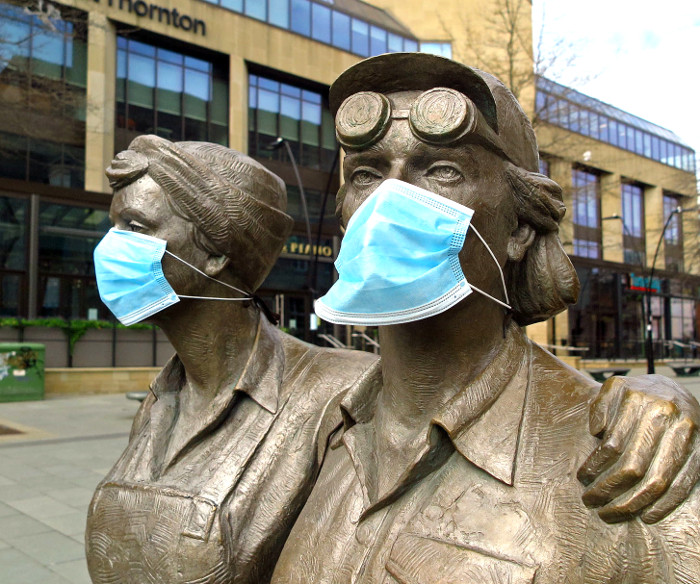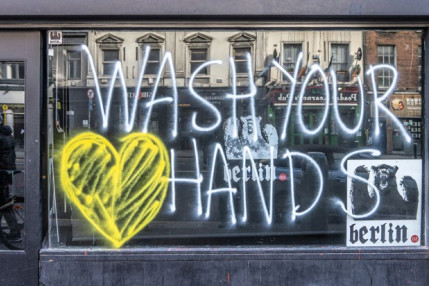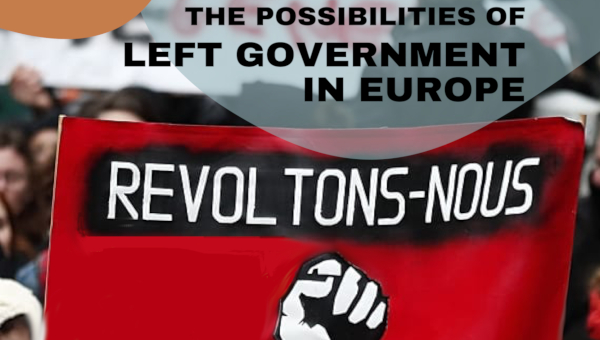A Window of Opportunity for Leftist Politics?
How to Continue In and After the Corona Crisis
The current crisis represents a new form of crisis and can certainly be understood as a sign of things to come. This is because it is not only the result of a dynamic internal to the economy as was the case with the financial crisis, which many on the left had predicted and foreseen. Today’s crisis is what the left has called an intersectional crisis: one in which the metabolic process between nature and society has been disturbed and is thus experiencing a crisis, manifesting itself in the climate crisis as well as through the spread of pathogens. In this regard, the corona crisis is externally induced, every form of society needs to react to it and limit economic and social activities for a while. And yet, the crisis is also part of the capitalist dynamic, which itself creates profound crises for the societal relationship to nature. It is in this sense that the cause of the crisis does not come from external forces.

The current situation starts with the expansive mode of production and living that increasingly restrict the habitats of other species, allowing viruses to spread to humans and bacterial pathogens to be transmitted much more readily. To turn the argument on its head, this would mean less capitalist valorization of nature. In addition to social and economic transformations in all aspects of life, it would mean curbing the proliferation of land used for production, settlement, and agriculture of monocultures and factory farming which operate at the cost of nature and of wildlife conservation, both of which are essential to promoting CO2 neutrality.
The crisis also indicates that neoliberal globalization has over-expanded the chains of production and supply. It doesn’t make sense to transport products around the globe because of tax advantages or minimally higher profit margins. It doesn’t make sense to travel thousands of kilometres for a business meeting or a holiday. And it is not right that essential products are being produced only in China or India – and this includes medicines, face masks, and medical equipment. The (overly) intensified circulation of global capitalism is what enabled the virus to spread so quickly in the first place. As an example, the global tourist industry more than doubled between 2003 (the SARS outbreak due to SARS-CoV1) and 2020 (COVID-19 pandemic due to SARS-CoV2).
The End of Business as Usual as an Opportunity for the Left?
In the meantime, the coronavirus has simultaneously switched off capitalism’s autopilot mode in a number of countries – at least for a few weeks. This presents a great challenge, as it means that important social issues need to be consciously negotiated, at least initially: which activities, services, and products are truly ‘essential’? During the financial crisis, it was the banks that were ‘too big to fail’, but now it is ‘officially’ the cashiers, nurses, technicians, and bus drivers, etc. who are ‘essential’.
Given the rapidly developing situation in the news, it is becoming apparent to many that the appropriate mode to address pressing challenges for humanity is to move away from allowing individual interests in the maximum utilization of capital to dominate. A selection of absurdities helps to illustrate this point. Because the ski operators didn’t want to shut down the ski season in Ischgl (Austria), they kept the lifts in operation, thereby turning Ischgl into a hub for the spread of corona. Faced with the crisis, business and governments try to purchase all the protective materials and respirators before others do, thereby driving the prices up. First, the USA tried to buy the German vaccine company CureVac so that it could produce a potential vaccine exclusively for Americans – “America first” in the corona era. Then, General Motors, the largest manufacturer of automobiles in the country, was forced by martial law to switch production to urgently needed ventilators so GM could realize astronomical prices – just like pharmaceutical companies in the US doubled the prices for medicinal products related to COVID-19.
Here in Germany, people are hesitant to switch the lines of production to, for example, protective clothing as long as there is no guarantee that the goods will be accepted for a longer duration, and thus, people are making sober calculations regarding whether it wouldn’t be easier to just wait a couple of weeks and then continue manufacturing cars to earn money. At the same time, the market has ‘adjusted’, such that local prices for breathing masks have increased nineteen – fold. Private clinics are moving some of their staff into short-term jobs (Kurzarbeit) instead of making their capacities and resources available for society’s needs. Elsewhere, there is a desperate search to find staff for the newly built intensive stations.
But these ‘blossoms’ of capitalism should not blind us to what is also currently taking place. Broad sections of society have accepted the idea that the production of medication and protective equipment should be politically guided according to the needs of the public in case of emergency. Furthermore, solidarity is being organized in neighbourhoods. The belief in managing the healthcare system for profit is losing favour and becoming increasingly less stable. The proposal to close at least half of Germany’s hospitals, an idea submitted in the summer of 2019 by leading health policy makers in the German government in cooperation with the Bertelsmann Foundation, is now absolutely hysterical. In Bogota’s metropolitan area, over 120 kilometres of temporary bike lanes were created within two days to relieve the overcrowded public transport system at the expense of car lanes – which means that more was probably done in these two days than in the last twenty years for transitioning to sustainable transportation. In Detroit, striking bus drivers quickly established a temporary free public transport system: tickets will not be checked until the corona crisis is over in order to keep the drivers safe from infection. General Electric workers are on strike in order to force production to be converted to medical devices. The cessation of ‘non-essential’ production was initiated by unauthorized strikes in Italy (at Fiat as well as in the shipyards, aviation, and arms and steel industries) and poverty revolts forced the implementation of a temporary unconditional basic income. Further unauthorized strikes are taking place to halt production and to demand sick benefits: at Mercedes, Iveco, and Volkswagen in Spain; at Fiat – Chrysler in Sterling Heights, Whole Foods and Amazon in Chicago, New York, and elsewhere in the USA. Until 1st of July 2020, Portugal is granting “express legalization” for all migrants living there, thereby guaranteeing them full residence rights, including health insurance. In Germany, the debt ceiling (Schuldenbremse) has been repealed and an opportunity has been created to break with the longstanding investment backlog of state investments. The Economist, the “magazine that speaks for the British millionaires,” warns its class that “it will become harder to make the argument that the ‘magic money tree’ does not exist. If central banks promised to fund the government during the coronavirus pandemic, they might ask, then why shouldn’t they also fund it […] to invest in a Green New Deal?” The world is “in the early stages of a revolution in economic policymaking. The state is likely to play a very different role in the economy – not just during the crisis, but long after.”
The corona crisis is being experienced as a collective moment of shock. The German Chancellor has called it the greatest challenge facing the country since the Second World War. One of the key lessons being learned right now is that if something is politically desired then politicians are capable of pressing “pause” on entire economic sectors. They are capable of taking action directly and of making changes if they want to. We should keep reminding ourselves – as well as the rest of society – about this in the future. Making a systemic socio-ecological change is a question of will and not of ability. It’s a question of how and not whether. With various measures and rescue packages, governments around the world are now trying to get their economies back on track as quickly as they can and with as little change as possible – just like they did with the austerity politics in 2010, which made it clear that the general public had to bear the costs of the crisis. As such, it is now time to commence with the political struggle of determining the conditions under which the ‘play’ button will be pressed again – so that the massive state interventions and the billions upon billions of euros in crisis aid can be combined with a paradigm shift in society.
The Corona Crisis Collides With the Crisis of Overproduction
The current crisis is hitting capitalist societies at a time when the consequences of the most recent financial and economic crisis are still palpable in a number of countries. The recovery from the 2008-09 recession was mainly driven by growth in China and a handful of other countries that rose in the hierarchy of the international division of labour. In contrast, growth remained weak in the old capitalist centres. The mass movements against austerity politics, which reached their pinnacle with the Occupy and Indignados movements in 2011, suffered defeats and were unable to impose progressive solutions to the crisis in any part of the world. Socialist forces remained weak. In comparison, nationalist, authoritarian, and populist forces became stronger in numerous countries and have even come into power in some. A new mode of accumulating capital on a higher scale could not be initiated. On the contrary. The corona crisis, which is closing substantial parts of social and economic life, is colliding with a business cycle that is coming to an end. The current recession began “after a weak growth cycle of nine years” in the fall of 2019 at the latest. The net investment ratio between 2009 and 2019 was less than five per cent of the economic output. This was due, in particular, to the low level of investment activity by companies (and this in spite of hype surrounding the so-called digitization). Meanwhile, structural overaccumulation grew in comparison to its level before the economic and financial crisis in 2009. The seemingly endless provision of liquidity from the central banks prevented a more fundamental purge from taking place, and it further encouraged the setup of dangerous financial overaccumulation. In the aftermath, the austerity politics to contain national debt with bank bailouts has curbed growth and driven entire countries into depression. Accordingly, growth in Germany averaged 1.3 per cent per year between 2008 and 2018, and fell last year to 0.6 per cent.
In contrast to 2007-08, the current crisis was triggered by a slump in production, and not by the lending system (the subprime crisis). Accordingly, industrial production in Germany slumped by almost five per cent last year, and global production growth dropped to zero. The leading factor for this was overproduction due to massive overcapacities in the global auto industry (but also in the chemical and steel industries). For two years now there has been an absolute decline in automotive production. In Germany alone, that is a decline of more than one million cars. The slump in automobile manufacturing was (over)compensated by the enormous expansion of the Chinese market after the 2009 crisis. But now, production in China is also falling drastically, with a decline of more than two million units – and this came before the corona crisis.
A massive crisis across different sectors is thus concurrent with an economic cycle that is coming to a close – and now the measures to contain the coronavirus are compounding the simultaneous collapse in supply and demand. Corona is a “crisis accelerator.”
Corporate coffers are nevertheless filled to the brim and the crisis will be used to consolidate and expand corporate reach of power with the financial resources provided by the state. Meanwhile, we fear that a number of small and medium-sized businesses will not survive the crisis; particularly subcontractors, small and medium-sized factories and retailers, freelancers, and the self-employed. It may be the case that further monopolization results from accumulation profiting from the crisis by plundering the state. In the global financial crisis from 2007 and after, the rescued banks used the state funds as a way to further concentrate and centralize capital; and right now, it is already becoming apparent that corporations like Amazon will see drastic gains in their market shares because of the lockdown.
To date, the German government has planned to provide aid through state loans, subsidies, and the deferral of tax payments. More than 36,000 people applied for the Corona Emergency Aid within a short period of time in Berlin alone. Many of them will never be able to repay these outstanding financial obligations due to the decline in their income. In contrast to 2009 and thereafter, the savings banks and credit unions will be much more affected than the big banks that are active in the investment branch. The inevitable recession could be extended into 2021 from a wave of bankruptcies and a crisis of consumption due to declining incomes and a lack of investments as a result. Added to that is the threat of bankruptcies in the shipping, aviation, gastronomy (as has already been the case with the restaurant chains Vapiano and Maredo), tourist, and other sectors.
The crisis is also hitting Europe a time when the eurozone continues to be unstable. Since the outbreak of the Euro crisis in 2009, the European elites have not been able to mitigate the centrifugal forces of the single currency zone with structures that distribute the risks, despite numerous opportunities. Quite the opposite: the expansion of instruments of austerity politics has created an ample structure for surveillance and sanctions, which exacerbates the contradictions within the eurozone. The debate regarding deepening the economic and monetary union, which has been ongoing since 2012, largely ebbed away or broke down from the resistance put up by the Northern European bloc, headed by Germany. Following the German ordoliberal model of stability union (Stabilitätsunion), this bloc has prevented every attempt by France to pair a political union together with a monetary union.
The fact that the Southern European call for common Eurobonds was once again rejected in the midst of a major crisis in the EU clearly reveals the balance of power within the European economic project. While Eurobonds or temporary Corona Bonds would have enabled cheap refinancing of the countries most severely affected by the corona pandemic and thus a fair distribution of the costs of the crisis within the eurozone, the Northern European countries have been insisting on financing the countries in crisis with the European Stability Mechanism (ESM). This means, however, that the relief funds remain conditional rather than guaranteed and that the corset of austerity persists in the medium term. Added to that is the fact that the ESM only has a volume of €410-billion at the moment, which is likely to be insufficient given the banking and financial systems in a number of eurozone countries that are still fragile.
The balance sheets of European banks continue to hide nonperforming loans to a total of €786-billion – one in ten loans in Italy is at risk of defaulting (European Central Bank 2020). The lockdown constitutes a considerable burden for the Italian banking system, and it seems likely from our current point of view that a number of Italian banks will collapse. This, however, threatens to create a vicious cycle of crises related to banking and national debt; something which would endanger the monetary union and thus the entire European project.
National bankruptcy threatens a number of nations outside the EU as well, especially those countries that are heavily dependent on single export products or that have a weak production structure. Elsewhere, entire industries are on the brink of collapse. The fracking industry in North America, for instance, has become unprofitable due to the continuing drop in oil prices. The potential collapse of the Chinese shadow banking system could even destabilize China more than the financial crisis ten years prior had. Unlike in 2009, China will not be able to save the world economy by means of expanding its market at an unprecedented level. There is a small chance, if the country that was hit first is able to quickly cope with the effects of the crisis and get the economy rolling again. But this will not be enough for an export boom in Germany like back then.
The Corona Crisis is Strengthening the Political Executive and Defensive of the Left
Exceptional circumstances have always been the moment of the executive authority. Right now is not the time for the left to go on the offensive. Instead, we are on the structural defensive, even though left – wing movements have been increasingly successful in putting essential ecological and social issues on the agenda in recent years. Uprisings like #unteilbar, Fridays for Future, or those against the TTIP (free trade agreement) demonstrate the significant potential for left – wing mobilization in the German society and beyond. And yet, virologists and the government are currently dominating the media discourse. It is even more difficult than usual for the social left as well as Die LINKE (Left Party) to become visible and remain that way. Many pivotal leftist practices are currently shut down, including demonstrations, regular strikes, organizing in neighbourhoods and at front doors. Social movements – such as Fridays for Future – are relegated to social media. They are unable to add pressure for their causes on the streets and are uncertain in how to go about things. Trade unions, in particular, find themselves under pressure to put their alleged “special interests” (such as the struggle to raise wages or for better working conditions) on the backburner in order to avoid putting even more burden on the companies that are already faltering in the crisis. Impending collective bargaining rounds are hardly compatible with infection control and are thus being postponed. What would be necessary now would be greater emphasis on the political mandate of trade unions. The current debate regarding premium payments in caregiving and retail – at least in those areas that are ‘essential’ – demonstrates that what had previously been inconceivable is feasible now. Nevertheless, the central question will be whether the trade unions will succeed in developing new forms of collective action in order to continue asserting their severely weakened organizational power. The same goes for Die LINKE. Although it turns out that many of the issues they raise (above all healthcare and housing) are proving to be more relevant than ever, in a situation like this opportunities and practices are lacking that would make them more visible from the left. Surveys from USA to Germany – very different countries, indeed – show that despite the delayed reactions of governments to the COVID-19 crisis as well as their responsibility in making the neoliberal cuts to the healthcare systems, the governments are the ones who have so far benefited from the COVID-19 crisis – regardless of whether or not they talk incredible nonsense like Trump or Boris Johnson or act more or less reliable and rational like Merkel.
Just as in 2008-09, neoliberal dogmas are being wiped away every day in this crisis, yet this is only being done to save and stabilize an ailing capitalism with no horizon (at least as far as accumulation on an extended scale as well as a convincing project of political hegemony are concerned), to then muddle along with more or less authoritarian means. Authoritarian regimes such as those in Hungary or Poland are consistently heading toward authoritarianism and suspending democratic rights, which, as Hungary demonstrates, can even go as far as suspending parliamentarism or the freedom of the press. In many respects, this situation is becoming a “field for experimentation” for authoritarian government technologies. In Germany, it is “flexible risk management” acting on “a limited scope” that is prevailing instead. There are stay-at-home orders and contact bans, restrictions on the life of the economy, but not excessive ones. There’s a little less freedom here and there, a little more money for the health sector, as well as less political rights in general and less rights for trade unions (strikes and demonstrations have been made impossible), etc. For some, this is an example of policy acting with good judgment – it is more liberal than in other countries – but for others, it demonstrates delayed and inconsistent action. Both are right. Politically, this action strengthens the ruling executive as well as the leading parties in governments. It does not have to stay this way.
 This is because the state is demonstrating its capacity to act as well as an actionism that gives the “impression of acting” (Katharina Pühl). The state often reacts too late, and it often does not have the capacities to act since the public sector has been thinned out and emaciated in the last 40 years. Whether it be emergency services, the Agency for Technical Relief, public health departments, or even hospitals, administrations and infrastructures are no longer capable of providing their services. The lean neoliberal state reached its limits a long time ago. This is also becoming more apparent.
This is because the state is demonstrating its capacity to act as well as an actionism that gives the “impression of acting” (Katharina Pühl). The state often reacts too late, and it often does not have the capacities to act since the public sector has been thinned out and emaciated in the last 40 years. Whether it be emergency services, the Agency for Technical Relief, public health departments, or even hospitals, administrations and infrastructures are no longer capable of providing their services. The lean neoliberal state reached its limits a long time ago. This is also becoming more apparent.
And, there are also discursive openings. With regards to the balance of power, the left appears to be on the defensive, yet there are windows of opportunity to make some form of progress in other areas. It is still uncertain whether the crisis will develop in such a way that the seemingly stable executive branch will stumble in the end – yet, we need to be prepared for it. Either way, we have to use this window of opportunity while also highlighting, discussing, and organizing a perspective that reaches even further. This is not an “either/or” of achieving a voluntaristic “jackpot” or a pragmatic “small potatoes.” Instead, it unites practices of resistance and concrete entry projects with strategic perspectives. The specific constellation of the various, intertwined crises is unprecedented, the process of condensation (Poulantzas) remains open – and therefore its difficult to predict. Under no circumstances should things just return to the way they had been before the crisis. There can be no “going back”: “we won’t return to normality because normality was the problem,” as the protests last year in Chile had it.
A two-pronged strategy needs to be developed: on the one hand, it is a question of critically supporting the government measures to stabilize important social realms and protect larger sections of the population from the worst possible and immediate consequences of the acute situation of the crisis – as well as to raise one’s voice and seek opportunities for intervention whenever this does not prove to be enough. On the other hand, we have to make very clear that returning to the status quo from before, even in a modified form, as well as a steady course of action, like the Grand Coalition is attempting to do, would be wrong once the worst symptoms of the crisis have passed. A repetition of the policies from 2008-09 must be avoided at all costs.
Assuming that the acute crisis flattens, it is expected that the long-term assessment of the consequences of the crisis and the 2021 Bundestag elections will simultaneously become the focal point of national politics in the summer. This makes it possible for this Bundestag election to turn into a choice – it even demands it. There are two possibilities: either the ruling power bloc emerges from the crisis more consolidated and integrated or the lines of division become stronger again. Trade unions as well as other social and ecological forces can concentrate on pushing versions of what they had previously been pursuing. Or they could also focus on an alternative scheme and work toward that.
A number of social forces are currently submitting proposals for a change in direction that is social, democratic, ecological, global, and European while also demonstrating global solidarity. This is a great opportunity. Work should already be taking place to create a platform for joining these proposals and for developing them into a common force that would unite diverse positions and coordinate discussions and actions.
‘Essential’ is the new buzzword in English, but in German they speak of “systemic importance” (Systemrelevanz). This term refers to the work that is socially necessary from the perspective of reproducing this society and keeping it together, the basic needs of individuals and of society as a whole. The work of the many that keeps everyone alive, which also includes in the realms of social infrastructure and the unpaid work that is predominantly performed by women in (‘adopted’) families and households. For us, this cannot signify the preservation of the ‘system’, of what is wrong, the very thing that we, speaking from a socialist perspective, are trying to overcome. As such, society and the (capitalist) system are not being equated. The language of the media cannot be merely duplicated. Instead, it can be critically used in a discursive struggle for hegemony, in a shift in the relations of power, in a change of system, the other, that should be speakable once more. This is because numerous problems, some of which have been apparent for a long time already, are revealing themselves with particular clarity: what had previously perceived as being abstract or only as urgent to those who were directly affected is now being revealed to most people as a fragile existence, life itself.
Worried Subjectivities, Social Certainties in Question
The deep incisions in daily routines are having (socio-psychological) implications that are difficult to understand at this point. Despite the spontaneous solidarity in families, circles of friends, apartment buildings, and neighbourhoods, it is clear that the social and cultural infrastructure is not robust. Inequalities in the school system are to be expected, and the ministers of education and cultural affairs have even hinted at them with reference to the grading of school reports. There are many variables that prevent households from being able to facilitate home schooling: cramped spaces and a lack of hardware are but two factors that amplify educational inequalities as a result of the parents’ social backgrounds and professional circumstances. In general, it cannot be predicted how a prolonged break in everyday routines and an enduring situation of insecurity, etc. will be dealt with on a socio-psychological level. In addition to psychological deprivations or the increase in domestic violence, there is a growing willingness to shut out risk groups, which hinders their desired rapid return to normal life in the name of taking care of them: this is a potential reaction that should be prevented. A third set of implications of the subjective worries might be the relationship to public transport: could it lead to a renaissance of people driving alone in cars since there is more protection from strangers? Observing such ‘subtle’ subjective reactions to this currently unpredictable disruption will be indispensable in making adequate records of social moods and conditions for political strategies.
The insecurity also applies to our own psychological and physical conditions as political subjects of the left and socialist movements. The situation calls for action, for necessary changes – right now. At the same time, our (already limited) ability to act has been limited by the situation, subjectivity has become unsure. Added to that are fears for our own well – being, for those of our loved ones, for the state of the left, for the entire world. There is a pressing need to find (self)orientation, and the abundance of both information and interpretations is dizzying. The easy access to the media (particularly to the internet) not only offers a way to communicate and to keep ties of solidarity, but also is a moment of uncertainty. From all of this arises the danger of overload, resignation, paralysis, and even excessive voluntarism.
This can lead to a sense of agitation that is not only difficult to bear as individuals, but that also affects organizations on the left as a whole. Regardless of the resources that organizations or individuals possess – which, again, are severely limited by the current situation – the dynamics and pressure to act – now, more, with more decisiveness – threaten to override our own subjectivity, its suffering, and reproductive needs (once again). To quote Gramsci, there is a need of “sober, patient people” who “do not despair in the face of the worst horrors and who do not become exuberant with every silliness.” But there’s also a need for people who take care of one another. Solidarity in a wider sense. Maybe this will prove to be an opportunity for a left that is all too happy to be divided.
For a New Solidarity
It is not easy to operate in this new combination of highly dynamic crises, even less so when the crisis strengthens the state’s executive branch and forces the left onto the defensive. Nevertheless, the situation is open. Even if the executive branch is strengthened, it is still being driven by unprecedented events and without a plan. They can try to use the crisis to their advantage, but they are not immune to imponderables and failures.
Already windows of opportunity are opening up. The left has an immediate chance to intervene by translating the changing public discourse into a real shift in the relations of power and achieving concrete improvements, in five ways: a) above all by advocating for improvements in the health sector, and recognizing systemically important (women’s) professions and social infrastructures, and making sure they are adequately equipped; b) by promoting an improved “protective shield for the people” and questioning of the debt ceiling; c) by lobbying for a social-ecological investment offensive; d) by advocating for a democratic offensive that not only revokes the authoritarian crisis measures but allows real democratic progress that includes its social foundations; and e) by calling for direct assistance of refugees through concrete actions of rebellious state governments and civil society initiatives.
In these fields, forces should be concentrated and campaigns should be (further) developed that make few demands, while at the same time generating a productive conflict for the left and bringing about a broader perspective.
There are other partial openings in the social discourse which may not be sufficient for the immediate improvement of the political and social situation, but which nevertheless make leftist debates and positions in certain fields more visible: a) on the future of Europe and the question of European solidarity; b) in the debate on concrete international measures for health for all as a global social right; and c) in steps toward human security and civil crisis and conflict prevention.
In view of the imminent dangers posed by the counterforces and the defensiveness of the left in the crisis, there is at the same time no need to harbour false hopes for a left offensive. Let us call for green socialism, but let us advance concrete projects in this direction, in places where something could be pushed forward given the conditions of COVID-19 and economic crises, both happening in the tenth year of a deep organic crisis or an intersectional crisis. We need a little voluntarism against the depression caused by the crisis, but also critical realism for the long term.
The corona crisis reminds us how fragile life is, every life, and what is really ‘essential’. Perhaps not the most favourable political circumstance for the left, but still a window of opportunity for a new solidarity. •
This is an excerpt from the report “A Window of Opportunity for Leftist Politics?” which was published by the Rosa Luxemburg Stiftung. Translated by Hunter Bolin and Shane Anderson for Gegensatz Translation Collective.





